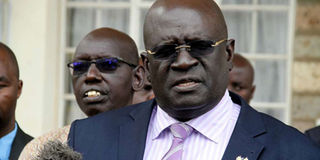Teacher crisis: Are schools ready for Grade 4?

Education Cabinet Secretary George Magoha. PHOTO | FILE | NATION MEDIA GROUP
What you need to know:
Although thousands of teachers have been trained on the Competency-Based Curriculum (CBC), there are fears that a majority are not well-equipped to take up the pupils transitioning to this new grade.
As schools reopen on Monday amid assurance by education managers that all is well, there are doubts on whether teachers are ready to take up Grade Four pupils.
Although thousands of teachers have been trained on the Competency-Based Curriculum (CBC), there are fears that a majority are not well-equipped to take up the pupils transitioning to this new grade.
The Ministry of Education has been rushing against time to train tutors before schools open.
The ministry started training the Grade Four teachers on Thursday this week. Still, only two teachers per school are attending these sessions.
But Cabinet Secretary George Magoha Friday was confident that all is set to go to the next level.
Grade Four involves eight 35-minute lessons every day. These are Physical and Health Education, Mathematics, English, Kiswahili or Kenya Sign language, Science and Technology, Social Studies, Home Science and Agriculture.
Pupils will also choose from Christian Religious Education, Islamic Religious Education and Hindu Religious Education. Other subjects are Art and Craft, Music, Pastoral Program of Instruction, Indigenous languages and Foreign Languages such as German, French and Arabic.
The subjects will be distributed into 40 lessons a week with the frequently taught subject having five lessons and the less frequent being taught once a week.
Normally, teachers in upper primary teach two to three subjects per class.
With only two teachers trained in upper primary, the workload is going to be heavier.
A total of 106,000 primary school teachers started a two-day training on Thursday. This brings the total number of teachers so far trained since the introduction of the CBC to 228,000.
In April, 91,320 teachers were trained countrywide to handle grades one to three. Another 68,490 were trained in August this year for the CBC.
Prof George Magoha said the ministry has distributed 98.8 per cent text books and will ensure the books will have reached all schools by Monday.
“We have faced some few challenges in some areas such as West Pokot, where a bridge has collapsed. However, the government has put in enough resources including providing standby helicopters to ensure books reach schools,” he said.
Seven publishers were picked by the Kenya Institute of Curriculum Development to ensure that 14.4 million books are supplied in schools.
Prof Magoha also issued a stern warning to school heads against increasing school fees.
He said the ministry has set clear guidelines on school fees and asked principals to adhere to the guidelines.
“Any head teacher who will ask for extra fees will face the full force of the law,” he said at Kenyatta University.
He disputed claims that he had changed the school fees policy and increased fees.
“Those alleging that I have increased fees must know that I have not changed any policy as far as school fees is concerned,” he said.
The government introduced the free secondary school education in 2018.
For the free day secondary education, all learners receive Sh22,244 per annum. Parents are not required to pay any extra fees for day scholars.
For category A schools, which are national schools and extra-county schools in Nairobi, Mombasa, Kisumu, Nyeri, Thika and Eldoret, the government will provide Sh22,244 while parents are required to pay Sh53,554, totalling to Sh75,798 per year.
Category B boarding schools and extra-country schools in other areas will receive Sh22,244 from the government while parents will pay Sh40,535, making the total school fees per year Sh62,779.
The government also increased the Special Needs Secondary Education funds to Sh57,974 while parents will be required to pay Sh12,790.





